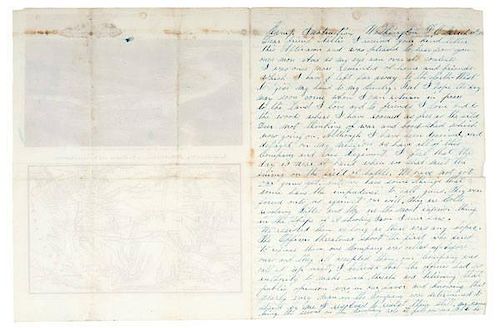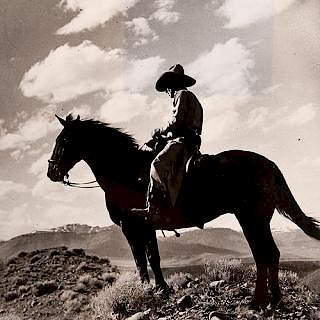Minnesota Soldiers' Civil War Correspondence with Nellie Florida, Including Letter Criticizing the Colt Revolving Rifle
About Seller
6270 Este Ave.
Cincinnati , OH 45232
United States
With offices in Cincinnati, Cleveland and Denver, Cowan’s holds over 40 auctions each year, with annual sales exceeding $16M. We reach buyers around the globe, and take pride in our reputation for integrity, customer service and great results. A full-service house, Cowan’s Auctions specializes in Am...Read more
Two ways to bid:
- Leave a max absentee bid and the platform will bid on your behalf up to your maximum bid during the live auction.
- Bid live during the auction and your bids will be submitted real-time to the auctioneer.
Bid Increments
| Price | Bid Increment |
|---|---|
| $0 | $25 |
| $500 | $50 |
| $1,000 | $100 |
| $2,000 | $250 |
| $5,000 | $500 |
| $10,000 | $1,000 |
| $20,000 | $2,500 |
| $50,000 | $5,000 |
| $100,000 | $10,000 |
About Auction
Jun 12, 2015 - Jun 13, 2015
Cowan's Auctions dawnie@cowans.com
- Lot Description
Lot of approx. 20 letters, some incomplete.
Joel Florida and George Ames traveled from Maine to Illinois by covered wagon. They married sisters, Lucinda and Sarah Woodard. Lucinda had two children, Ellen (Nellie) and George. After Lucinda died, Joel married her sister, Catherine, who had three children. In response to a campaign begun in St. Paul, the two men decided to move to Minnesota build a water-powered mill. They moved first to Minneapolis, then struck out to "wilder" lands. As the Woodard-Florida-Ames families struck out, traveling up the Mississippi River, they met Vermont native Guilford George.
The trio arrived at a small settlement on the Crow River in October 1855, then known as Greenwood, moving a bit downriver purchasing a claim from William Frazer and making nearby claims. Since winter was setting in, they returned to the city to gather settlers, leaving George to guard the claim. The following spring the settlers encountered a crew cutting a road from Minneapolis to Greenwood. They gave the road crew a hand, and, in return, the road ended at the new town, not quite making it to Greenwood. The new area (after some quarreling and negotiations) was named Rockford.
The area was thickly forested and there were "Indian troubles." In 1862 the Dakota War erupted. It is estimated that at least 800 settlers were killed and uncounted property damaged. At the same time, of course, the Civil War was raging to the south and east. It was difficult to come up with both Lincoln's quota and enough men to guard the settlers, who built forts around many buildings, including the Ames-Florida mill. The settlers petitioned Washington to send troops to fight the Indians. Some troops spent their first year of enlistment fighting Indians, then went on to fight "rebels."
It was in this environment that Joel Florida's children grew up. His first child, Nellie, began communicating with many of the young men. This lot consists of approx. 20 letters (a couple are incomplete) to Nellie from soldiers, friends and family members.
The first letter is from "Cousin Frank," dated Nov. 30, 1861 from Camp Jenkins, KY. Frank begins "I must drop you a few lines - per agreement." An agreement she seems to have made with most of the young men. He goes on to let her know that the 2nd MN Regt. is 30 miles south of them but the 1st Minnesota is not there.
Another of the earliest letters is from James Stacy, who is writing from Franklin, Wright Co., MN. His letter is primarily asking permission to begin corresponding with her. He does mention that he has heard that her father was going to move back to Illinois, making it too far for him to come see her. Many residents did move, many to the cities such as Minneapolis and St. Paul, but others went more distant, as "Indian troubles," or, more often, rumors of Indian troubles, erupted.
There are several letters from David W. Jones, who served in F&S in Washington, one from L.F. Patch (Co. B, 2nd Cav., Fort Ripley), a couple from F. McJenks (Co. A. 3rd MN Infy, Pine Bluff, AR), a whole and a partial letter from Curtis B. Ames (Co. A, 3rd MN Infy), plus friends Lizzie and Mary, her father, brother Jeb, uncle and cousins. The correspondents are spread out from Gainsville, NY to Washington, DC to Louisville, KY to Pine Bluff, AR.
The one letter that stands out is from "Jack." On patriotic stationery with a panoramic view of Washington, DC fortifications and map of Virginia between Washington and Manassas Junction, he writes from "Camp Instruction, Washington DC," giving the soldiers' view of the Colt Revolving Rifle:
I feel that the day is near at hand when we shal meet the enimy on the field of battle. We have not got our guns yet, but we have some things that some have the impudence to call guns. They were forced onto us against our will. They are Colt revolving Rifles and they are the most inferior thing in the shape of a shooting Iron I ever saw.
We resisted them as long as there was any hopes. The Officers threatened soot the first who dare to refuse them one Company was called up before ours and they all accepted them. our Company was called up next. I believed that the officers had no authority to make such threats and believing that public opinion was in our favor and knowing that nearly every man in the Company was determined to stand by me I resolved to resist them still my name being the second on the Company role it fell on me to be the first man to refuse them. our first sergeant took one. I was arrested on the spot and put in Irons and placed under guard with the most severe threats, namely that I should be shot on the parade ground as a traitor. Colonel Post said he would make an example of me for those who dared to disobey his legal orders. Twelve or fifteen of our men took the guns the remainder declaired they would stand by me to the last. Company D, the Maine boys, stood out to a man, their first Sergeant was Ironed and placed in confinement with me under similar threats. the remainder of the Regiment consented and took them, the boys who had stood out finaly consented to take the guns providing they would reliece the two prisoners. to this the officers consented and the guns were accepted. But some way or other the news got to McLellan who sent one of his aids up here to our reliece, but he seemed much surprised to find no prisoners in the guard house for refusing the guns. He said it was not McLellans intention to force the men. the officers tried to smooth the matter over but this did not do. he made farther inquiries and told the whole story by a private of Co. D. He then gave us all the assurance we wanted we should have Sharps Rifles within the space of four weeks. The time has expired and Sharps guns have not yet arrived but we are in hopes of geting them.
Last week we received orders to march on Saterday morning with these guns but a petition reached head quarters in time to over-throw the design of the officers which was to take us into active service with these guns. And you may bet they were mad when the orders was counter-manded. They lay all the blame on Co. A and call us cowards, but we have all of the city of Washington on our side.... yesterday the City was crowded with soldiers passing over the river to the field of action. our boys express their wish to be moveing if they could exchange these guns for muskets."
The war seen from the view of the northern frontier and its fearless inhabitants.Variable, as expected. Several with water stains making reading a bit difficult, but most are fine.Condition
- Shipping Info
-
SHIPPING. At the request of the buyer, Cowan's will authorize the shipment of purchased items. Shipments usually occur within two weeks after payment has been received. Shipment is generally made via UPS Ground service. Unless buyer gives special instructions, the shipping method shall be at the sole discretion of Cowan's Auctions, Inc.. Cowan's is in no way responsible for the acts or omissions of independent handlers, packers or shippers of purchased items or for any loss, damage or delay from the packing or shipping of any property.
-
- Buyer's Premium



 EUR
EUR CAD
CAD AUD
AUD GBP
GBP MXN
MXN HKD
HKD CNY
CNY MYR
MYR SEK
SEK SGD
SGD CHF
CHF THB
THB














